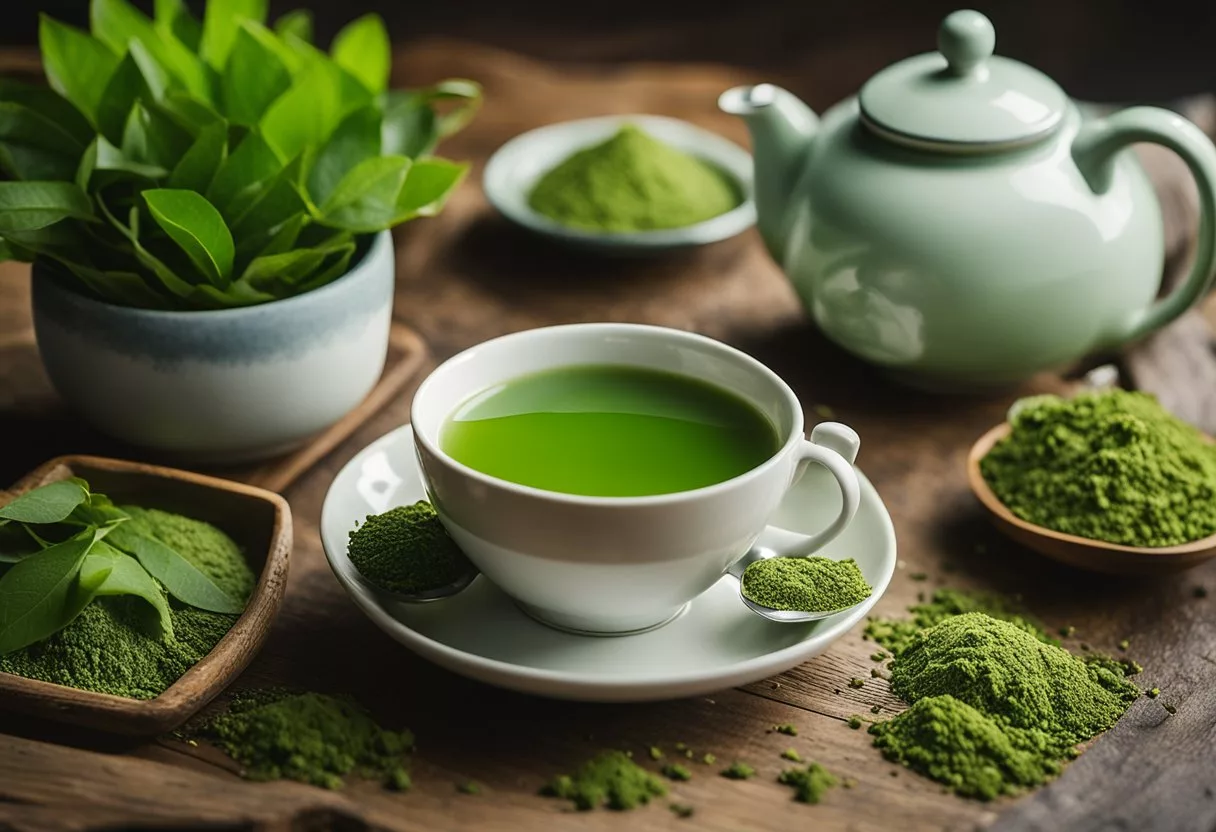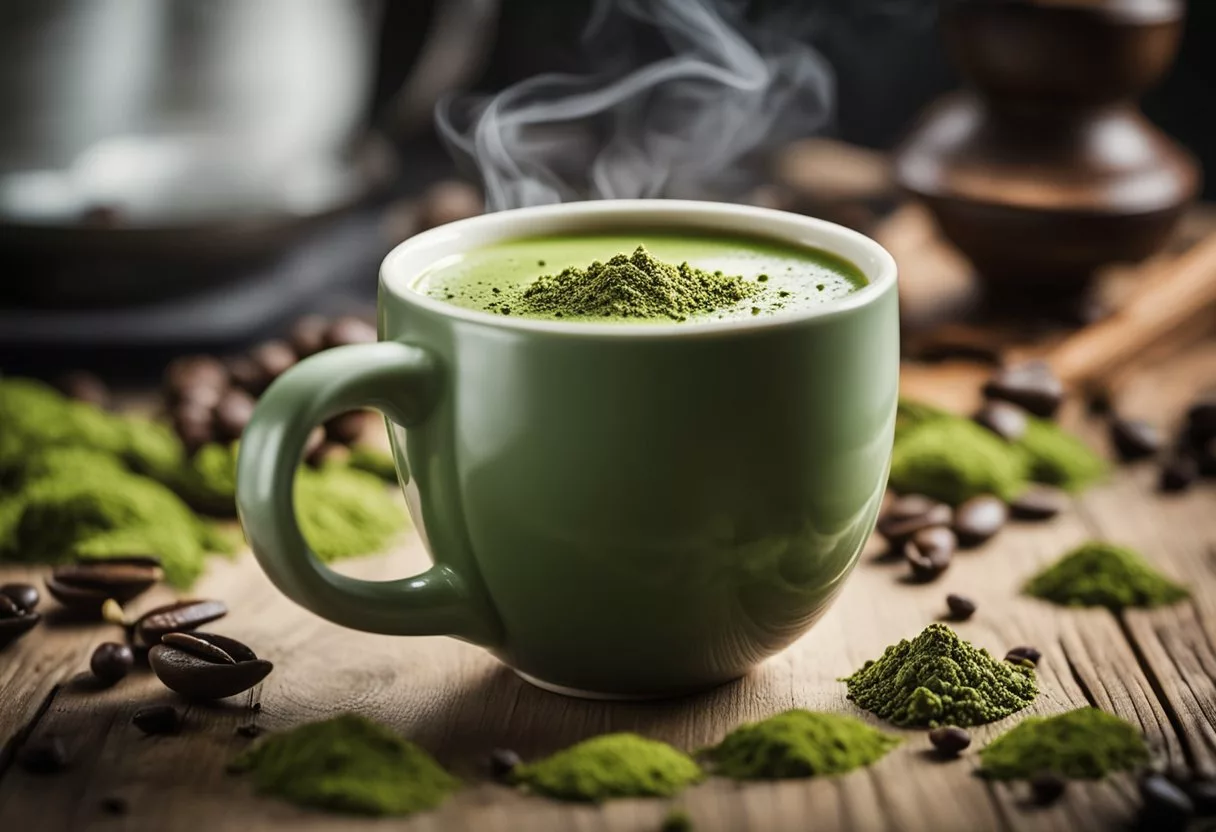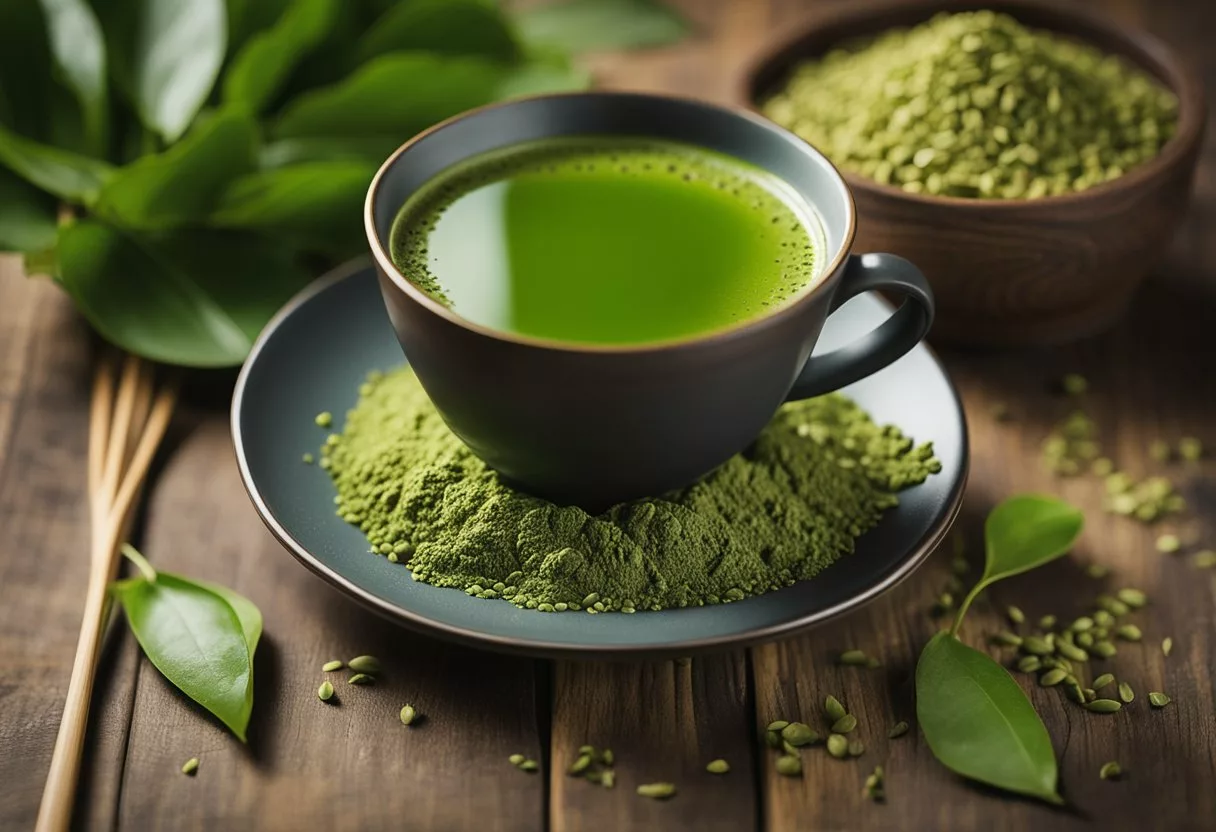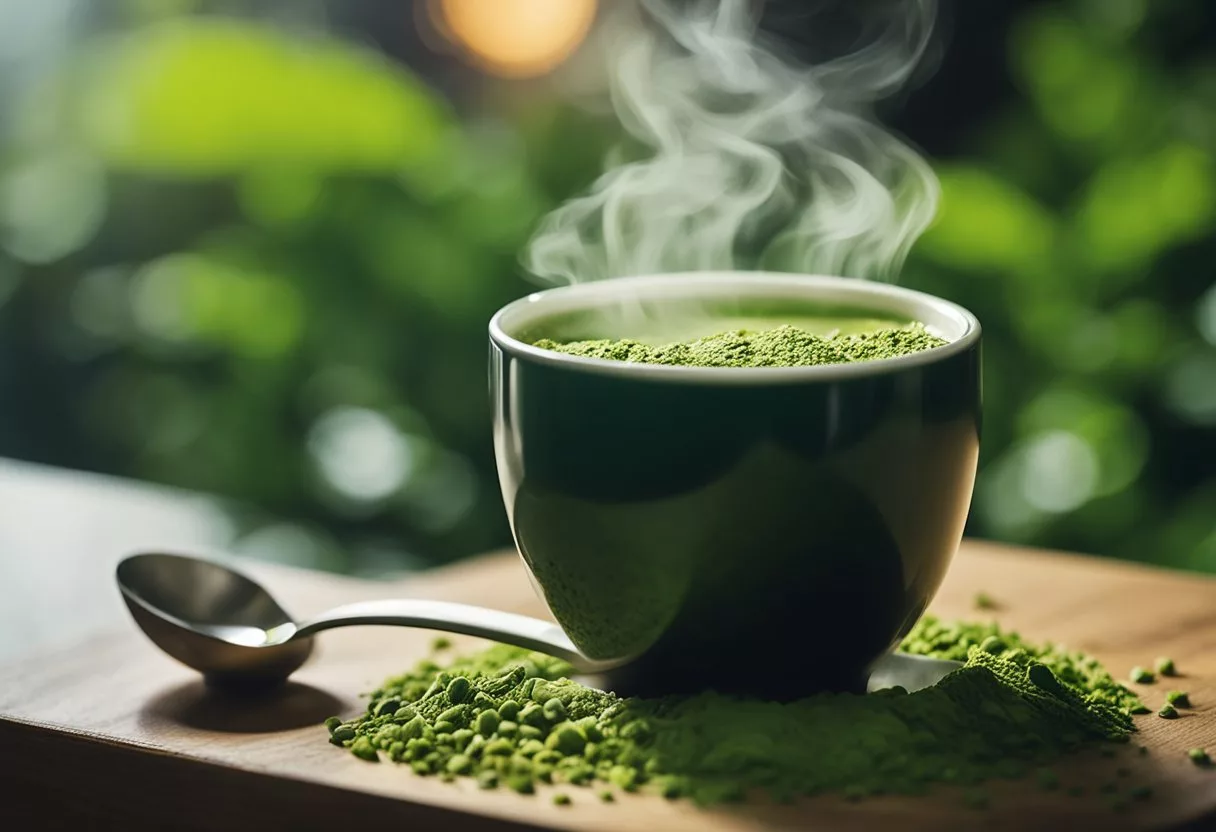Matcha coffee combines the unique properties of matcha green tea with the robust flavor of coffee. Many people wonder if this blend is good for them. Yes, matcha coffee can be good for you, offering a balance of energy and beneficial nutrients. Matcha has lower caffeine levels compared to coffee but provides a steadier energy boost, reducing the chances of jitters.

Matcha contains antioxidants known as catechins, which can support overall health. The presence of L-theanine in matcha is known to promote relaxation and reduce anxiety, making it an appealing option for those sensitive to caffeine. In contrast, coffee offers a quick jolt of energy that many people rely on to kickstart their day.
For those looking to enjoy a healthy beverage, blending matcha green tea powder with coffee might provide the best of both worlds. Each sip combines the smooth, earthy taste of matcha with the rich complexity of coffee, creating a beverage that can be both invigorating and soothing.
Matcha vs. Coffee: Understanding the Basics

Matcha and coffee are both popular beverages that provide caffeine and other health benefits. They have differences in their origins, production methods, caffeine content, and flavor profiles.
Origins and Production
Matcha originates from Japan and is a type of green tea. It is produced by grinding young tea leaves into a fine powder. The process involves shading the tea plants before harvest, which enhances their chlorophyll and amino acid content, particularly L-theanine.
Coffee comes from coffee beans, which are the seeds of the Coffee plant. It is grown in various tropical regions around the world. The beans are harvested, roasted, and ground to produce coffee. Each region's climate affects the coffee bean's flavor and strength.
Caffeine Content and Energy Effects
Matcha and coffee both contain caffeine, but the amounts differ. A serving of matcha, about one teaspoon of powder, contains roughly 70 milligrams of caffeine. Matcha's L-theanine content slows down caffeine absorption, leading to a steadier energy boost without the jitters.
Coffee typically has higher caffeine levels, with an average cup providing about 95 milligrams per serving. The effects of coffee's caffeine are more immediate, giving a quicker energy spike that can sometimes lead to a crash. This makes coffee a stronger stimulant but may cause more intense energy fluctuations.
Flavor Profiles
The flavor of matcha is unique; it is earthy, slightly sweet, and has a rich, umami taste. Its green color comes from the high chlorophyll content. The flavor can vary based on the quality and origin of the matcha powder.
Coffee's flavor varies widely depending on the type of bean, roast level, and brewing method. It can range from light and fruity to dark and bitter. Coffee tends to be more complex, with different notes such as chocolate, nuts, and berries. The roasting process significantly influences these flavors.
Health Benefits and Nutritional Profile

Matcha offers a unique combination of health benefits that make it a popular choice among health-conscious individuals. From its rich antioxidant content to its potential in disease prevention and cognitive enhancement, matcha presents various advantages.
Rich in Antioxidants
Matcha is packed with antioxidants, especially catechins, a type of polyphenol. These antioxidants help protect the body from oxidative stress, which can damage cells and contribute to aging and various diseases. An important catechin in matcha is EGCG (epigallocatechin gallate), which is known for its strong anti-inflammatory properties.
Besides EGCG, matcha contains other beneficial compounds such as chlorophyll, which also contribute to its health-promoting properties. The vibrant green color of matcha is due to its high chlorophyll content, which helps detoxify the body by removing harmful chemicals.
Potential in Disease Prevention
Consuming matcha regularly may help prevent certain diseases, thanks to its high antioxidant content. The EGCG found in matcha has shown promise in protecting against heart disease and certain types of cancer. It helps in reducing inflammation and regulating blood pressure and cholesterol levels.
Additionally, the phytochemicals in matcha may help manage blood sugar levels, potentially lowering the risk of type 2 diabetes. Some studies suggest that these compounds also aid liver health by protecting against liver damage and promoting its overall function.
Enhancing Mental Function
Matcha contains L-theanine, an amino acid that promotes relaxation and enhances mood. The combination of L-theanine and caffeine in matcha can boost cognitive performance without the jittery feeling often associated with coffee. This can lead to improved concentration and a more balanced energy level throughout the day.
The caffeine in matcha is released more slowly compared to coffee, providing a more sustained energy boost. This makes it a suitable option for individuals seeking to enhance mental clarity and stamina.
Weight Loss and Metabolism Support
Matcha can aid in weight loss by enhancing the body's metabolism. EGCG is known to increase the rate at which the body burns calories, making it easier to shed unwanted fat. Regular consumption may also support fat oxidation during exercise, contributing further to weight management.
Additionally, matcha's ability to boost energy levels can enhance physical performance, encouraging more effective workout sessions. It also helps in maintaining a healthy metabolism, thanks to the synergistic effects of its caffeine and catechins, which together promote better metabolic function.
The Impact of Matcha on Lifestyle and Diet

Matcha tea is known for its potential health benefits and its role in various cultural practices. This section explores how matcha can be integrated into daily routines and compares it with other popular superfoods.
Integrating Matcha into Daily Consumption
Matcha is often consumed as tea but can also be added to various recipes. A matcha latte, for instance, combines matcha powder with milk and sweetener. To avoid excess sugar, use unsweetened milk and natural sweeteners.
Dietitians recommend starting with small amounts due to matcha's caffeine content, which is about 70 mg per cup. This amount of caffeine is similar to a shot of espresso, providing a significant energy boost without causing the jitters often associated with coffee.
In Japan, matcha is traditionally consumed during tea ceremonies, emphasizing mindfulness and relaxation. Incorporating matcha into your routine can complement a balanced diet by providing antioxidants, such as vitamins C and E, and beneficial plant compounds called catechins, which may help reduce inflammation and improve cognitive function.
Comparing Matcha with Other Superfoods
Matcha can be compared to other popular superfoods like black tea, kale, and collagen supplements. Matcha stands out due to its high levels of antioxidants and unique amino acids like L-theanine, which may help reduce stress and anxiety.
While black tea also provides antioxidants, matcha offers a higher concentration per serving. For those looking to support weight loss, matcha may help by boosting metabolism and enhancing fat burning during exercise. This makes it an appealing option for health-conscious individuals.
Unlike collagen supplements, which are often taken for skin and joint health, matcha primarily promotes overall well-being and mental alertness. It is also shown to potentially help with conditions such as high blood pressure and type 2 diabetes by improving blood sugar levels and cardiovascular health.
When compared to other plant-based superfoods, matcha's rich nutrient profile and versatility in recipes make it a valuable addition to any diet. Balancing consumption to avoid sleep issues like insomnia is important, as high caffeine intake can disrupt sleep patterns. For those concerned about heavy metals, opting for high-quality, tested matcha can minimize exposure to lead and other contaminants.
Side Effects and Considerations

Matcha and coffee each have their unique side effects and benefits. It's important to understand the potential risks and how to consume them safely.
Understanding Matcha’s Side Effects
Matcha contains caffeine, which can cause sleep issues and anxiety if consumed in large amounts. It may result in jitters or an increased heart rate. Some people might experience allergic reactions, including itching and rashes.
Heavy metal contamination is a concern since matcha is made from whole tea leaves. Consuming large quantities might lead to liver issues. Research suggests a possible link to liver toxicity and liver cancer with excessive intake. Drinking matcha hot may increase the risk of esophageal cancer.
Safe Consumption Practices
To avoid side effects, limit matcha intake to 1-2 servings per day. This helps prevent sleep problems, anxiety, and high heart rates. Keep in mind that matcha's caffeine content is generally lower than coffee's, but can still impact energy and mood.
Opt for quality matcha to minimize heavy metal exposure. Check for third-party lab testing to ensure safety. Avoid drinking extremely hot matcha to reduce esophageal cancer risk. Discuss with a healthcare provider if you have pre-existing liver disease or other health concerns.
By following these guidelines, you can enjoy matcha's benefits while minimizing potential health risks.